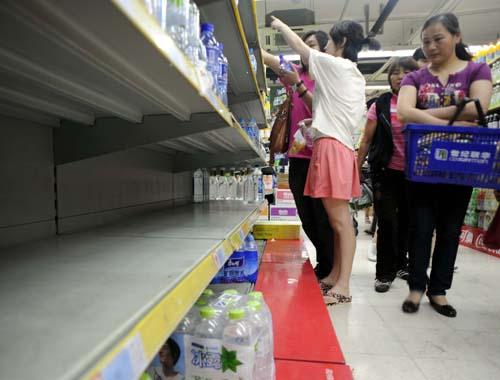
Residents in Hangzhou, capital of Zhejiang province, rush to buy bottled water at supermarkets on Monday. The demand for bottled water rose quickly after a chemical spill polluted a river from which the province draws drinking water. [Photo/China Daily]
SHANGHAI - A recent chemical spill into the Xin'an River, an important source of drinking water for East China's Zhejiang province, has led five water utility companies to stop drawing water from the river, a spokesman with the local environmental protection bureau said on Monday.
By noon on Monday, the contamination had affected the water supply of at least 552,200 residents of the counties and cities near the provincial capital city of Hangzhou, said Lao Xinxiang, spokesman of the Hangzhou Environmental Protection Bureau.
Authorities have been monitoring the river closely since late Saturday night, when a tanker truck overturned on a highway near the river, causing the truck to spill its load of carbolic acid, an industrial chemical used to make plastic and other materials.
Estimates hold that heavy rains have washed as much as 20 tons of carbolic acid into the upper reaches of the Xin'an River.
Carbolic acid and its vapor are corrosive to the eyes, skin and respiratory system. Contact with the substance can cause burns. It can also harm the central nervous system, heart, lungs and kidneys.
The Xin'an River, which feeds into the Fuchun and Qiantang rivers, is the main source of drinking water for several cities in Zhejiang, including Hangzhou.
To dilute the spill, the Xin'an River dam has increased its rate of discharging water to 1,239 cubic meters a second from 268 cubic meters a second.
Even though the drinking water in downtown Hangzhou has not been contaminated, residents have rushed to buy bottled water, emptying many supermarkets' shelves of that product.
The Hangzhou government has called on citizens to store water for use in their daily needs.
Zhejiang residents expressed concerns over the safety of the drinking water produced by Wahaha, Nongfu Spring and other local beverage companies that draw water from the Xin'an River. Some even said it would be best to buy water produced in Guangdong or Hainan provinces.
But Wahaha, which is based in Hangzhou and makes more beverage products than any other Chinese company, denied that the Xin'an River is polluted and declined to comment further on the issue.
Despite the worries, customers at most supermarkets in Hangzhou had bought out within two days the bottled water produced by the beverage companies in Zhejiang.
Residents rushed to supermarkets to buy bottled water in the fear that other sources of drinking water will be contaminated for some time.
In most Hangzhou supermarkets, customers had cleared the shelves of bottled water by noon on Monday. Some supermarkets had managed to restock the product by 4 pm on Monday only to see it sell out within an hour.
"There is no bottled water now, and there will be no bottled water tomorrow either," said a clerk surnamed Zhang at a supermarket at Jiefang road, Shangcheng district.
"No matter what the brand is, it's out of stock."
Yuan Fang, a 28-year-old resident in Hangzhou, said she had never bought bottled water before learning of the recent pollution, which prompted her to spend 500 yuan ($77) on 20 bottles.
"The domestically produced bottled water, which costs less, was sold out," she said. "So I have to pay a higher price for the imported kind."
Sales of water filters were also occurring quickly, driven by residents' fears that the supply of safe bottled water would continue to be short for some time.
"I sold 500 filters today (Monday) and most of the buyers are from Zhejiang province, especially Hangzhou," said Wan Liming, an online shop owner.
Wan said he had only sold 20 filters in May. On Monday, his stock was sold out in three hours.
The price of bottled water did not change at most Hangzhou supermarkets but soared in some small shops, as fears over water pollution prompted people to flock to convenience stores in search of drinking water.
Han Jing, an editor working for the Hangzhou-based Qianjiang Evening News, went to a convenience store near central Hangzhou's Dragon Sports center at noon on Monday to buy a bar of chocolate. There she was surprised to see that the shelves had been cleared of bottled water. Only then did she understand the rush city residents were in to buy drinking water.
"I was kind of nervous to see that the racks were all empty," Han said. "So I hurried to get one 5-liter jug of water for 10 yuan, even though it used to cost about 7 yuan. The last three boxes of bottled water there were saved for the shop manager and the two shop assistants."
Wang Ying contributed to this story.





